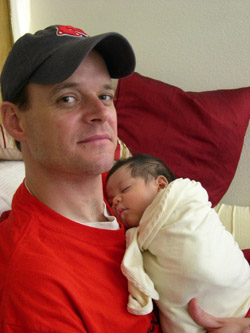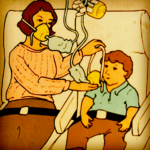Peter Delevett is an editor, erstwhile columnist and occasional travel writer at the San Jose Mercury News. His “Wiretap” column was required reading for hundreds of thousands around the world during the dot-com bust. His travel pieces have won prizes from the North American Travel Journalists’ Association, the Solas Awards competition and the Society of Professional Journalists. Delevett has frequently been featured on radio and television, and and his work has appeared at WorldHum.com and in Travelers’ Tales, the Honolulu Advertiser, the New Orleans Times-Picayune and the Miami Herald, among many others. His Web site is www.moontripping.com.
How did you get started traveling?
I was born in Okinawa while my dad was in the Army, and while I don’t remember living there, I grew up with a conscious sense of having come from another country. It made me very curious about exploring the world.
As a kid, I first ventured abroad to Mexico and Europe as part of boys’ choirs. Then, when I finished college, I spent 14 months backpacking across Asia and Europe, starting with a return to Japan, which felt very full-circle. That really stoked the fire to see as much of the world as possible and to write about it.
How did you get started writing?
I’m one of those lucky people who always knew what I wanted to do. I wrote for my school newspapers starting in elementary school, and in college I interned at successively larger papers.
I’d say the experience that really cemented my commitment to being a journalist was in the spring of 1992, when I was stuck in Bangkok for six weeks with dengue fever. There was a coup going on, and it was incredibly inspiring to see how the English-language papers kept covering the protests day after day, at great risk to themselves. Ultimately — in part, because the papers refused to stop covering the story — the protests built to the point where the coup failed.
What do you consider your first “break” as a writer?
My first paid gig came during my freshman year in college, when I sold a freelance piece to a historical magazine; that was a real thrill.
As a traveler and fact/story gatherer, what is your biggest challenge on the road?
Probably taking legible notes! I’m always scribbling in notebooks, on the backs on envelopes or ticket jackets, etc.
Actually, one of my worst experiences came during the first few weeks of my 14-month globe-trot, when I lost a notebook I’d been using to jot down impressions, notes, etc. I still wonder what nuggets I might have lost there.
What is your biggest challenge in the research and writing process?
The Internet is a fantastic research tool; I often ask myself what journalists used to do without it. Of course, you have to be careful about the quality of the information there, but generally I find it incredibly useful.
As for writing, I sometimes liken the process to carving a log of wood into a sculpture; I tend to start off hacking the rough outlines into shape, and I keep working at it with increasingly finer grades of sandpaper until I’m pleased with it. Sometime I use outlines, but more frequently I don’t.
I’ve found that, with travel stories in particular, it’s sometimes hard for me to know how best to wrap up the narrative. I tend to write them chronologically, so if there’s not a natural story arc, I might try searching for a broader point I can end up on. The danger there can be making sure you know your subject well enough to make a well-informed point.
What is your biggest challenge from a business standpoint?
Maybe it’s the cost of living and the challenges of having a family. I often fantasize that if I didn’t have a mortgage and other commitments, I’d quit my day job for a low-paid gig at a travel publisher or, better yet, head back off overseas and make my living as a full-time freelancer. (The reality, though, is that I’m probably not self-disciplined enough to make that work.)
Have you ever done other work to make ends meet?
My answer to this question is probably different than most of the writers you profile, because travel writing isn’t my full-time gig. In fact, it can be a challenge to carve out the time for my travel writing, especially since my wife and I just had our first child. Jim Benning at World Hum, who has a young daughter, advised me to do as much as I could before the baby was born; I should have taken his advice!
What travel authors or books might you recommend and/or have influenced you?
Mark Salzman’s Iron and Silk has been a real inspiration; I read it right before taking off for my big trek in ’91-’92, and it helped me decide to write about the experience. (I’ve got my travel memoir in front of a publisher now). I admire Paul Theroux, particularly Riding the Iron Rooster. And Pico Iyer is not only a fabulous writer but has been very encouraging to me over the years; he’s got the career (and the voice) I’d love to have.
What advice and/or warnings would you give to someone who is considering going into travel writing?
Another interviewer once asked me that, and my answer was, “Keep your day job.” Maybe I should qualify that to add, “Until you’ve built up a solid enough body of work to start selling yourself to editors.”
What is the biggest reward of life as a travel writer?
There’s no greater thrill than grabbing your pack and passport and getting on a plane — wherever it’s going. The more you travel, the more you realize how incredibly rich and diverse this planet is, and the more you appreciate both the limitations and the benefits of where you live. Being able to share all those experiences with readers helps me keep alive the feeling of being on the road even after I’ve come home.





